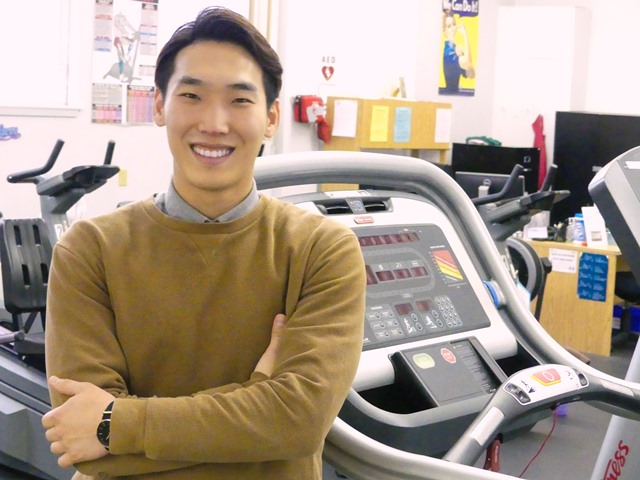
Kang believes that lack of exercise intervention during active surveillance may play a role in why more than half of prostate cancer patients eventually need medical treatments.
According to Faculty of Physical Education and Recreation doctoral candidate Dong-Woo Kang, approximately one third of Canadian men diagnosed with low-grade prostate cancer undergo "active surveillance" opting for this monitoring program option over surgery, radiation or hormonal therapy-aggressive therapies that can have side effects such as urinary and sexual dysfunction.
Active surveillance is a treatment option recommended to low grade cancer patients where tumor growth and cancer progression can be closely monitored for a period of time before more aggressive treatment plans are put into effect. Prostate cancer patients on active surveillance typically undergo blood testing every three months and a biopsy once every year to a year-and-a-half. Some cases of prostate cancer can remain in active surveillance for up to five, 10 and even 20 years before needing surgery, radiation or hormonal therapy.
But, as Kang explains, active surveillance does not include any behavioral components such as nutrition or exercise. Kang believes that this lack of intervention during active surveillance may play a role in why more than half of prostate cancer patients eventually need medical treatments.
"Tumor growth and fear of cancer progression are two main factors why prostate cancer patients eventually opt for or need more aggressive treatment. By incorporating exercise and physical activity into active surveillance, we can potentially prolong the time frame before medical treatment is needed."
To test the impacts of exercise during active surveillance for prostate cancer patients, Dong-Woo will be conducting the first ever clinical trial, coined the ERASE Trial. Dong-Woo will work with prostate cancer patients who are currently in active surveillance two to three times a week in a monitored fitness environment at the University of Alberta where the patients will work through carefully-planned exercise program. Kang will be exploring how exercise impacts three specific areas: tumor progression-related outcomes, patients' fear of progression, and physical fitness and function to pre-condition for eventual medical treatments.
Previous studies informing Dong-Woo's trial have shown that exercise increases immune function, which is important for cancer patients.
"Innate immune function, specifically natural killer cell activities, can find the tumor in the body and attack cells that promote tumor progression," said Kang "Studies have shown that one exercise circuit can actually increase immune function by four times as well as a gradual increase in basal immune function over weeks of an exercise training."
Kang believes that evidence from the ERASE trial will show that exercise may increase immune function, slowing tumor growth for the patients, further delaying the need for medical treatments.
Kang also believes that by adding an exercise component to active surveillance, patients' fear of progression will lessen and the longer they will remain in the monitoring program.
"Fear of progression stems from the patients' anxiety of not taking any course of active intervention to treat their cancer. They have a hard time doing nothing while the cancer continues to progress. Exercise can potentially help reduce the fear and anxiety patients may have from living with cancer."
The final area the ERASE trial will hopefully address is improving patients' overall physical health-mentally and physically-so they can be better prepared for when they eventually do need medical treatments. Previous research shows that more than half of prostate cancer patients will eventually have to undergo surgery, radiation or hormone therapy to eradicate the tumor and treat the cancer. Kang believes that incorporating exercise into active surveillance may improve treatment completion rate, reduce the side effects of medical treatments, and prevent comorbidities and eventually improve overall survival.
Dedicating his academic life to exercise and cancer, also as ACSM-Certified Clinical Exercise Physiologist & Cancer Exercise Trainer, Dong-Woo believes that exercise can and should become an important part of treating the disease that the Canadian Cancer Society's recent stats say will affect one in every two Canadians during their lifetime.
"I have been studying exercise in cancer patients since 2010 and have been interacting with many cancer patients during this time. I believe exercise can be not only a helpful management tool for cancer, but can be used as a treatment option before, during and after treatment."